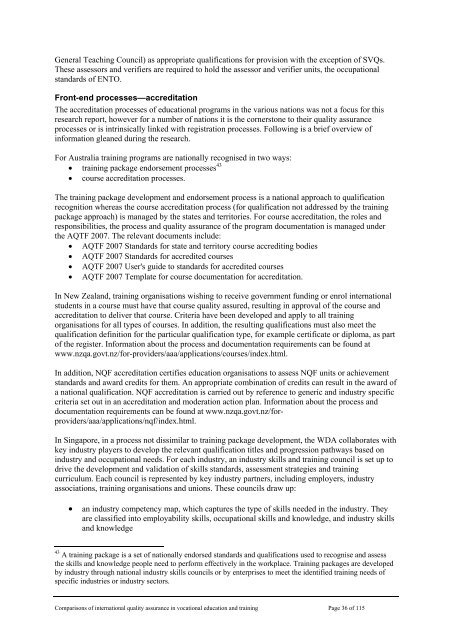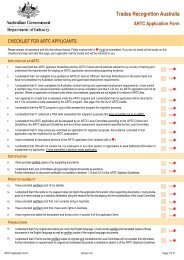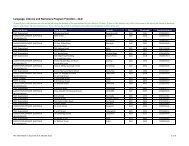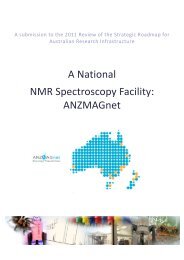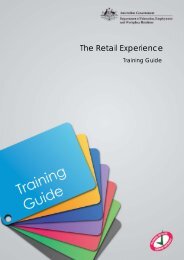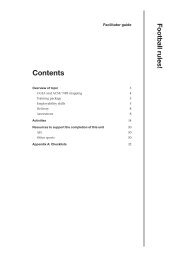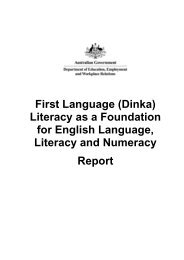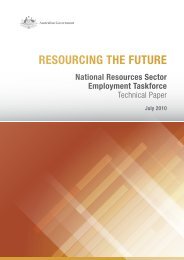Review - Department of Innovation, Industry, Science and Research
Review - Department of Innovation, Industry, Science and Research
Review - Department of Innovation, Industry, Science and Research
You also want an ePaper? Increase the reach of your titles
YUMPU automatically turns print PDFs into web optimized ePapers that Google loves.
General Teaching Council) as appropriate qualifications for provision with the exception <strong>of</strong> SVQs.<br />
These assessors <strong>and</strong> verifiers are required to hold the assessor <strong>and</strong> verifier units, the occupational<br />
st<strong>and</strong>ards <strong>of</strong> ENTO.<br />
Front-end processes—accreditation<br />
The accreditation processes <strong>of</strong> educational programs in the various nations was not a focus for this<br />
research report, however for a number <strong>of</strong> nations it is the cornerstone to their quality assurance<br />
processes or is intrinsically linked with registration processes. Following is a brief overview <strong>of</strong><br />
information gleaned during the research.<br />
For Australia training programs are nationally recognised in two ways:<br />
• training package endorsement processes 43<br />
• course accreditation processes.<br />
The training package development <strong>and</strong> endorsement process is a national approach to qualification<br />
recognition whereas the course accreditation process (for qualification not addressed by the training<br />
package approach) is managed by the states <strong>and</strong> territories. For course accreditation, the roles <strong>and</strong><br />
responsibilities, the process <strong>and</strong> quality assurance <strong>of</strong> the program documentation is managed under<br />
the AQTF 2007. The relevant documents include:<br />
• AQTF 2007 St<strong>and</strong>ards for state <strong>and</strong> territory course accrediting bodies<br />
• AQTF 2007 St<strong>and</strong>ards for accredited courses<br />
• AQTF 2007 User's guide to st<strong>and</strong>ards for accredited courses<br />
• AQTF 2007 Template for course documentation for accreditation.<br />
In New Zeal<strong>and</strong>, training organisations wishing to receive government funding or enrol international<br />
students in a course must have that course quality assured, resulting in approval <strong>of</strong> the course <strong>and</strong><br />
accreditation to deliver that course. Criteria have been developed <strong>and</strong> apply to all training<br />
organisations for all types <strong>of</strong> courses. In addition, the resulting qualifications must also meet the<br />
qualification definition for the particular qualification type, for example certificate or diploma, as part<br />
<strong>of</strong> the register. Information about the process <strong>and</strong> documentation requirements can be found at<br />
www.nzqa.govt.nz/for-providers/aaa/applications/courses/index.html.<br />
In addition, NQF accreditation certifies education organisations to assess NQF units or achievement<br />
st<strong>and</strong>ards <strong>and</strong> award credits for them. An appropriate combination <strong>of</strong> credits can result in the award <strong>of</strong><br />
a national qualification. NQF accreditation is carried out by reference to generic <strong>and</strong> industry specific<br />
criteria set out in an accreditation <strong>and</strong> moderation action plan. Information about the process <strong>and</strong><br />
documentation requirements can be found at www.nzqa.govt.nz/forproviders/aaa/applications/nqf/index.html.<br />
In Singapore, in a process not dissimilar to training package development, the WDA collaborates with<br />
key industry players to develop the relevant qualification titles <strong>and</strong> progression pathways based on<br />
industry <strong>and</strong> occupational needs. For each industry, an industry skills <strong>and</strong> training council is set up to<br />
drive the development <strong>and</strong> validation <strong>of</strong> skills st<strong>and</strong>ards, assessment strategies <strong>and</strong> training<br />
curriculum. Each council is represented by key industry partners, including employers, industry<br />
associations, training organisations <strong>and</strong> unions. These councils draw up:<br />
• an industry competency map, which captures the type <strong>of</strong> skills needed in the industry. They<br />
are classified into employability skills, occupational skills <strong>and</strong> knowledge, <strong>and</strong> industry skills<br />
<strong>and</strong> knowledge<br />
43 A training package is a set <strong>of</strong> nationally endorsed st<strong>and</strong>ards <strong>and</strong> qualifications used to recognise <strong>and</strong> assess<br />
the skills <strong>and</strong> knowledge people need to perform effectively in the workplace. Training packages are developed<br />
by industry through national industry skills councils or by enterprises to meet the identified training needs <strong>of</strong><br />
specific industries or industry sectors.<br />
Comparisons <strong>of</strong> international quality assurance in vocational education <strong>and</strong> training Page 36 <strong>of</strong> 115


